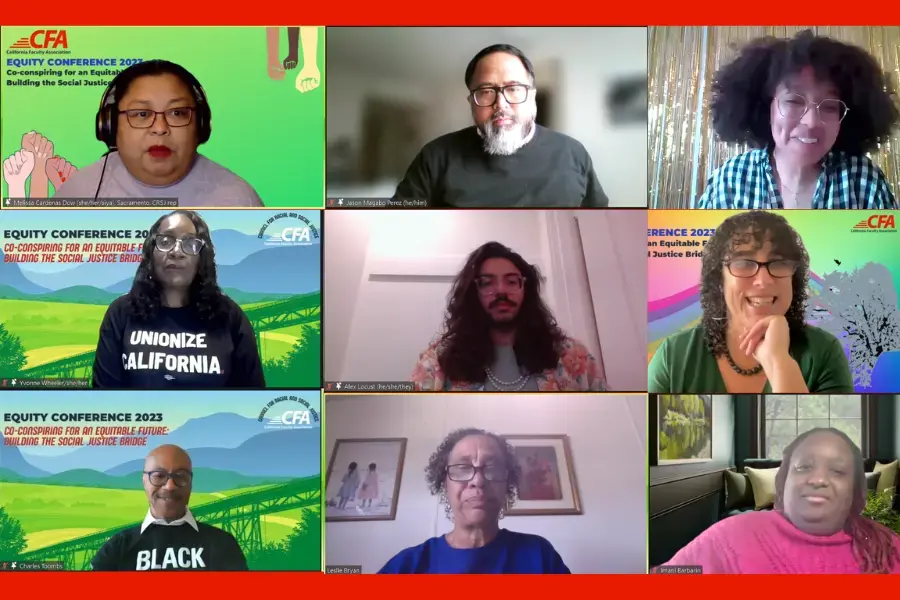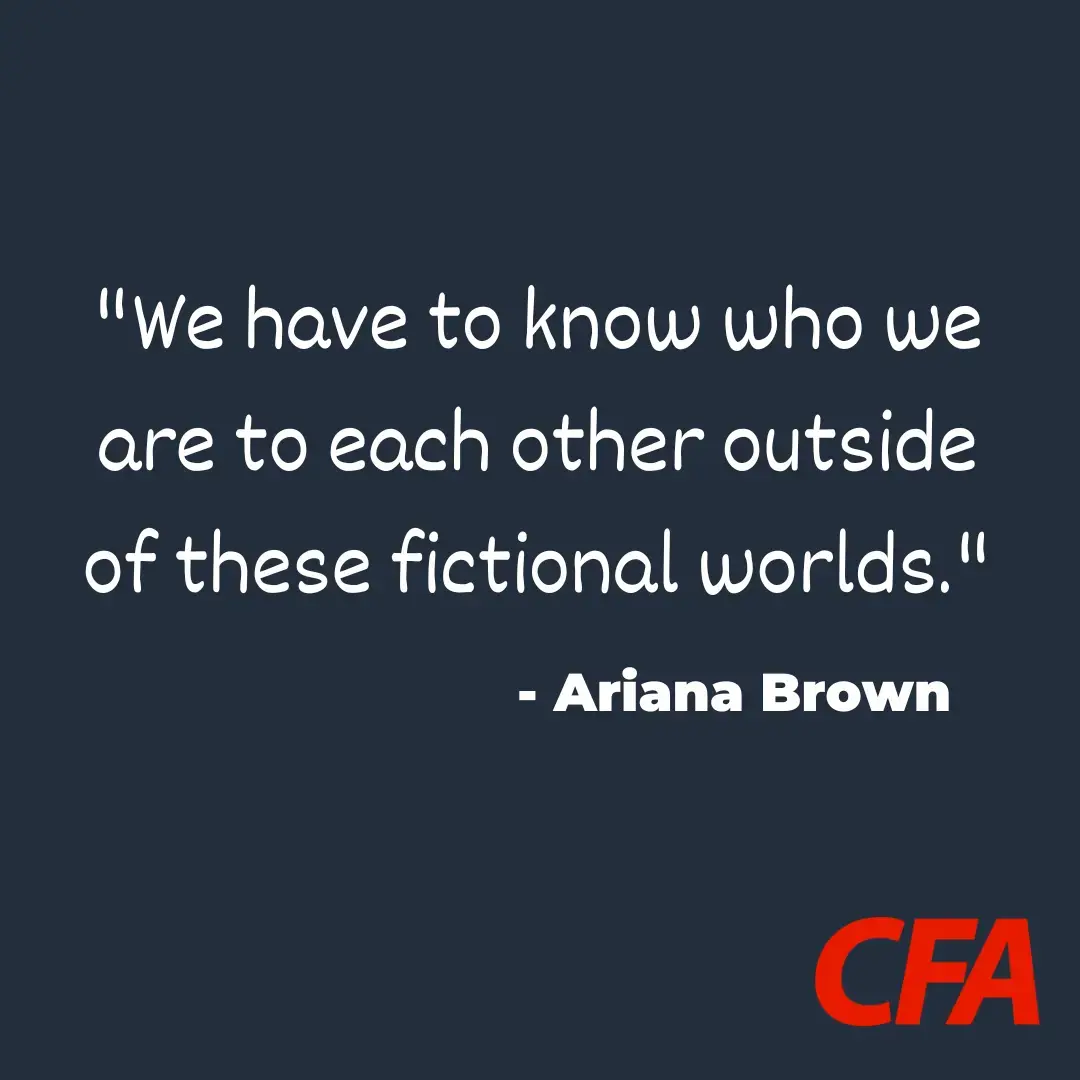“Co-conspiring for an Equitable Future: Building the Social Justice Bridge”
The annual Equity Conference – a project of the Council for Racial and Social Justice – is a celebration of CFA’s shift to become an anti-racism and social justice (ARSJ) union. CFA President Charles Toombs explained, “we have been doing a lot of work eliminating systemic inequity and oppression at the CSU.”
CFA continuously asks and thinks about solutions to the persistent anti-Black racism at the CSU and about ways to extend and deepen our ARSJ work.
Toombs announced that in anticipation of reopener bargaining, the Equity Conference began with a half-day Bargaining Institute last Tuesday for the first time. The institute was an opportunity to engage in the bargaining campaign by centering ARSJ. Attendees began articulating their stories on how they fight for ARSJ on their campus.

Overall, the Equity Conference week had a strong foundation in the arts.
Poet and teacher of creative writing Ariana Brown opened the conference with provocative ideas about identity and community. Through a Zoom-calibrated interactive session, Brown guided the audience through her writing and self-discovery.
Brown used the image of Gaspar Yanga as a focal point to understand her Mexican identity as a Black woman in south Texas. Yanga led a slave uprising in colonial Veracruz and established the first self-governing Black community in the Americas. Like Yanga, Brown sees herself as having “an adversarial relationship with the state.” Brown argued for new notions of pride and country, saying “cultural alone will not save us,” further arguing, “me being proud of being Mexican will not lead us to liberation.”

Brown further emphasized to achieve liberation, “we have to know who we are to each other outside of these fictional worlds.” For Brown, liberation means actively engaging in local movements for change.
At this year’s Equity Conference, we had the good fortune of watching the documentary Singing Our Way To Freedom by Paul Espinosa. The film focused on the life and contributions of legendary San Diego area Chicano activist and musician “Chunky” Gonzalez. Espinosa’s work interrupts the intentional effort to erase Chicanx and Latinx stories, and the film was intended to recover part of our history. Of note, the film depicts Gonzalez’s growing connection with Latin American protest music of the 1960s & 70s.
Disability justice is a concern for all of us on the CSU campuses and within our communities. The Equity Conference brought to light issues of accessibility and ableism with two amazing presenters, Imani Barbarin and Alex Locust.
Imani Barbarin returned by popular demand. She spoke to the perception of disabilities and how others can subjectively define one by focusing on implied impairments. Barbarin reminds attendees that “any sort of marginalization is inherently disabling.” Barbarin points out that while people have impairments, it is through society’s treatment of people’s impairments and ableism that people “lose the ability to be reliable narrators of our own story, losing the ability to direct our own lives.” Consent becomes fleeting.
In straightforward terms, Barbarin explained how ableism and white supremacy intersect in a world designed by and made for ideal, often white male bodies. Those not conforming to this dominant ideal are constantly overlooked and minimized.
Barbarin reminds us that the pandemic was a mass disabling event that we still haven’t taken seriously. Furthermore, the ravages of climate change and extreme weather are already disproportionally affecting disabled folks.
Disability justice activist Alex Locust brought a fun and engaging game show presentation style. Locust explained that everyone benefits from disability justice. Locust argues that a disability justice perspective provides an intersectional approach that addresses racism, sexism, LGBTQIA+ concerns, white supremacy, ageism and sizeism. While Locust may live with an impairment, he doesn’t feel disabled until he tries to do day-to-day tasks and realizes how unsympathetic cities and inaccessible buildings make him feel limited and constrained.
Chair of CFA’s Disability Caucus Leslie Bryan shared that, “on our campuses we must co-conspired with our union colleagues, including other campus unions, to advocate and fight for disability justice in the workplace, especially our classrooms and other learning environments. We should engage community disability advocates in this justice fight and challenge the leadership of our campuses when it comes to disability justice within the CSU.“ You can learn more about the Disability Caucus by emailing Bryan.
CFA Vice President of Lecturers, South, and CSU Fullerton lecturer Monishia “Moe” Miller led a session on restorative practices and community processing. In Miller’s community justice model, the goal is to repair harm to facilitate healing. When we care for the damage that sometimes happens between people, we move toward healing as a society.
Miller encourages us to be authentic as we find ways to connect in our organizing and work. To share who you are, it’s important to have a story about your life and how you relate to work.
Showing up with authenticity builds community, but what do we do if people are being destructive? When there is uncertainty in the space Miller reminds us to focus on organizing or seeking “one ally at a time.”
Students for Quality Education (SQE) interns shared a presentation that highlighted their activism in response to Title IX violations at CSU Channel Islands and harassment related to gender identity, appearance, and uniforms at CSU Maritime.
SQE students regularly contribute to faculty priorities by testifying at budget meetings and advocating for more funding for the CSU. Most recently, they described how workload issues affect their studies.
During the questions and answer portion, it was recommended that if faculty want to support student activism, they can create classes related to topics and campaigns the students are developing. They can also design ways for students to earn credits for research projects at the university and other related institutions.
For CFA, the struggles at the bargaining table to address alternatives to campus policing were a central topic of conversation for speakers.
Writer, lawyer, and abolitionist Andrea Ritchie anchored her talk in the long history of the movement and the politics of mass organizing for change.
Ritchie asserted that police “don’t prevent or interrupt violence.” A police budget does not materially change and transform the conditions that lead to violence and crime; instead, expanding police budgets makes things worse. Rather, we can start articulating a vision rooted in resources and what survivors say they need, which Ritchie said are “autonomy and self-determination.”
In response to the hesitancy by members to name abolition as a political project, Ritchie explained that “we aren’t organizing based on polls. We are organizing around a vision for the future.” Ritchie suggests that the term we use “alternatives to campus policing” fixes police as the center of imagination. Instead, we must say what we mean and begin discussing the world we want, a world that offers a sense of safety and well-being.
University of California Santa Barbara Asian American Studies professor Diane Fujino carefully surveyed the history of solidarity between Asian and Black organizers and activists. Fujino explained that the model minority myth countered the revolutionary demands of the Black Power movement, emphasizing individual hard work instead of protest. In contrast, authentic solidarity can dismantle how white supremacy wants us to work against each other. However, forming these solidarities while necessary and sometimes difficult is often transformative for a movement.
Fujino also reminds us that for Dr. Martin Luther King Jr., forming solidarity with the Asian American community meant critiquing the imperial dynamics of the war in Vietnam. This position wasn’t well received at the time.
Fujino also calls us to question the role of the police. We are all hampered by the lack of options because no one is safe when the police are present. Fujino asked pointedly, “What lessons come from mass doses of violence to solve problems?”
Yvonne Wheeler, the new head of the Los Angeles County Federation of Labor, greeted CFA members by proudly exclaiming, “My fellow troublemakers at CFA.” Wheeler explained that she understands the ravages of prejudice and racism as a “daughter of Louisiana”, and she knows that “racism poisons the soul of a nation.”
She came to the presidency during a difficult time after the October 9, 2022 leak of inflammatory anti-Black and anti-Indigeneity comments by three city council members and the then-head of the Los Angeles County Federation of Labor.
In response, the LA Fed has since hosted the biggest MLK celebration in labor history. At the event, she “unequivocally denounced what was said.” LA Fed staff suffered greatly, acknowledged Wheeler, so looking after their needs was a top priority.
Regarding police associations and labor, Wheeler also explained that membership in the LA Fed is voluntary. Therefore “none of us can remove them from any federation.” However, she supported having police off campus.
Wheeler thanked members “for teaching our next generation to dream big and be unapologetically bold.”
A dynamic panel of Black and Indigenous community organizers shared their ongoing co-liberation efforts for accountability and solidarity after the release of the October 9 tapes. Three of the four council members have since resigned. One Los Angeles City Council member remains in office and has rebuffed calls for his resignation.
CFA member leader and Black Live Matter-LA founder Cal State Los Angeles Professor Melina Abdullah described feeling betrayed and surprised since “literally all these people except for (then-Councilmember) Cedillo were my friends.” She explained how hurtful and harmful it was that leaders were “in the room in the first place conspiring against Black power.”
For panelist Henry Perez of Inner-City Struggles, it was a reminder that colorism is very present and that “we have a lot of decolonization to do in our communities.” For Perez, it was unforgivable that people he regarded as friends would plot against Black and Indigenous People and look to diminish renter influence.
Director of Center for Indigenous Languages and Power Luis Lopez-Resendiz, was not subtle that the tape was released on Indigenous Peoples’ Day since, from his perspective, anti-Indigenous sentiments are so pervasive. In the recording, it was notable. Nevertheless, Lopez-Resendiz reminded the audience that his Indigenous roots reside in Oaxaca and that “Oaxaca represents the rebellious states in Mexico.”
Organizer Sheila Bates thought about children in her family and how to explain the prejudiced comments directed at children. Bates noted that the sentiments reflected in the tapes have led directly to policy, as, for example, votes to expand an “exploitative police budget that threatens Black lives.”
All panelists noted that they have been able to build bridges to form broader supportive coalitions. An audio recording will not undo the legacy of multiethnic organizing.
Poet, professor, and community organizer and CFA member Jason Magabo Perez reflected on the nature of organizing as a practitioner of Ethnic Studies. So much about society is about violently silencing our perspective and voice, which is why the conversations raised by Ethnic Studies are a place of dignity and working towards “treating each other with genuine, sincere care and love.”
Magabo Perez explained that CFA’s work to assert a vision for the future of the CSU collectively is an ongoing cycle of reflection, grief intimacy, and renewal; therefore, “solidarity is a rough draft.”
Our work at CFA to build solidarity is perpetually unfinished. Most importantly, Magabo Perez borrows from Professor Lisa Marie Cacho in asserting that we must value everyone’s life to redistribute dignity.
In the words of Imani Barbarin, “What would life be like if we showed up for one another’s dream?”
Note: Equity Conference organizers will post session videos in the coming weeks. For those videos, resources, and materials, visit the Equity Conference webpage.
Join California Faculty Association
Join thousands of instructional faculty, librarians, counselors, and coaches to protect academic freedom, faculty rights, safe workplaces, higher education, student learning, and fight for racial and social justice.